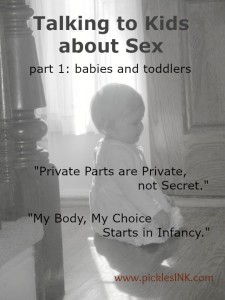Private Parts are Private, not Secret.
1. Use proper anatomical terminology for body parts: Penis, testes, vulva, vagina (Quick anatomy lesson: “Vulva” refers to whole area commonly referred to as a girl’s “private parts.” “Vagina” refers to the specific opening within the vulva. Of the two, “vulva” is generally the more useful and appropriate, unless you’re talking about where babies come from.) Using the proper words from the very beginning will allow you to become comfortable using them and hearing them.

Talking to Kids about Sex part 1: babies and toddlers
2. Teach toddlers that the parts their underwear or bathing suit covers are their own private parts. Private means it belongs to them, and only they can touch or look at them. The only exception is parent or caregiver changing a diaper, giving a bath, or helping them go to the bathroom. Private does not mean secret – they should never have to keep a secret about their private parts.
3. From a very young age, you will notice that your child touches their private parts. This is completely normal – and should not be punished. Encourage proper hygiene, “Okay, let’s wash hands before you play with toys,” and appropriate locations, as Lea Grover so succinctly puts it in her post, “We don’t touch our vulvas at the table.”
4. If anyone – even someone they love – looks at, touches, shows them, talks about, or asks them to keep a secret about private parts, they should tell a safe adult right away. That could be you, a teacher, a grandparent – anyone who makes them feel safe and comfortable. People who sexually abuse children use fear, shame, ignorance, and secrecy as weapons. In starting from infancy talking about body parts without shame or embarrassment, you ensure that if anyone ever tries to take advantage of your child, they will have the language to tell you without any fear of getting in trouble for talking about it.
My Body, My Choice Starts in Infancy
1. Pay attention to your baby’s cues when you play (tickling, for example), and stop as soon as they seem uncomfortable. Then let them tell you when they want you to start again. Even in infancy, you lay the groundwork for your child’s right to choose what happens to their body. “Are you ready for more tickle fingers? Yes? More tickle fingers? Okay, here come tickle fingers!” As they learn to talk, reinforce their right to say yes or no by stating it back to them. “No? No more tickles? Okay! Tell me if you want more tickles! No more tickles until you say, ‘More tickles!'”
2. Set boundaries with other adults – strangers, friends, and even (or especially) family members. Again, pay attention to your baby’s cues. They will tell you if they don’t want to be passed around, hugged, kissed, tickled, etc. We often say yes out of a need to be “polite,” but it’s perfectly reasonable to say, “Sorry, Auntie Doris, it looks like Persephone’s not in the mood to be kissed right now.” And when some random stranger gets upset because you won’t let them nuzzle your baby, rest assured that YOU are not the rude one.
3. As your child gets older and more verbal, it will be easier for them to make their own wishes known, so reinforce their choices. When someone leans in for a hug, ask your child, “Would you like to give Auntie Doris a hug?” and if they say no, support that. “Looks like Persephone isn’t ready for a hug right now. Maybe later!” Teach them to say, “No, thank you,” and perhaps offer a handshake or high five. It can be embarrassing when your child refuses (sometimes loudly!) to hug or kiss a doting relative, but when you politely but firmly reinforce their refusal you teach them a) they don’t have to do something they don’t want with their body just to keep from hurting someone’s feelings; and b) they can trust you to stand up for them.
4. Teach your child to ask others – kids and adults – before hugging them and to respect their wishes, and model this yourself. It is important for them to learn that consent goes both ways, and the easiest way to know if someone wants to do something is to ask them.
Teaching your kids about healthy sexuality isn’t scary – It isn’t even about sex!
[tweetthis twitter_handles=”@karynpickles”]It’s reasonable to say, “Sorry Auntie Doris, Persephone doesn’t want a kiss right now.”[/tweetthis]
~ karyn
Enter your email on the right to subscribe so you don’t miss Parts 2 and 3.
Have any questions or comments about Part 1? Let me know in the comments!
I WISH I had been more aware of this when my big ones were little. They were very shy and did not always like to be hugged and kissed but older family members/friends were always insistent and you couldn’t “be rude” by refusing. UGH! No means no–even if you’re saying no to Auntie Doris’s sloppy kisses. I even think that sometimes forcing our kids to TALK to strange adults (even if they are not strange to you) negates their feelings and teaches them that the adult’s feelings and wishes are above their own need for personal space and boundaries.